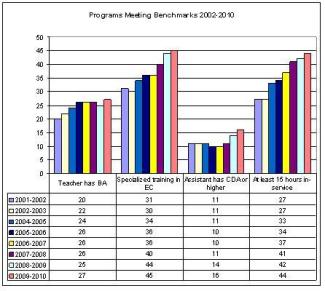
This Week
Thank a Teacher
May 4, 2011
From elementary school students to U.S. Secretary of Education Arne Duncan, people across the nation are taking time to thank a teacher throughout the week. That’s because this week is Teacher Appreciation Week, a time to not only celebrate our educators but also to learn more about teaching as a profession.
Years of research have found that teachers play an extremely important role in the preschool classroom. Teacher qualifications are often an indicator of a pre-K program’s quality. Better education and training for teachers can improve the interaction between children and teachers, which in turn benefits children’s learning. The most effective preschool educators have at least a bachelor’s degree and specialized training in early childhood. But while this is the norm in kindergarten classrooms, this is not always the case in preschool classrooms.
When we analyzed data from the latest State Preschool Yearbook, we found that 27 of 52 state-funded pre-K initiatives require that pre-K classroom teachers have a bachelor’s degree and 45 require lead teachers to have specialized training in early childhood. Only 16 state-funded programs require assistant teachers to have at least a child development credential or equivalent. While progress has been made in state policies regarding teacher qualifications since we first started analyzing data in 2002, still more can be done. The figure below provides a visual representation of the number of state programs meeting our benchmarks regarding teacher policies over the past eight years.

Since NIEER began tracking teacher qualification requirements, we’ve seen the most improvement in requiring 15 hours of professional development each year for lead teachers as well as more states requiring specialized early childhood training for lead teachers. Progress has been slower in requiring BAs for lead teachers, and fewer than half of all state-funded programs require a CDA for assistant teachers. And, when we moved away from state-funded preschool initiatives and looked at child care, the picture was bleaker. Only 16 of 50 states have any teacher education requirements, and none of those states require a bachelor’s degree.
A newly released policy brief from NIEER and the Center for the Study of Child Care Employment, written by Marcy Whitebook and Sharon Ryan, says it’s not just the quantity of teachers’ formal education but also the quality and content of that education. Whitebook and Ryan find a mismatch between the qualifications for the most effective teachers and the supports that these teachers receive to improve upon their work. Indeed, the latest Yearbook shows that only 44 of 52 state-funded pre-K programs have a policy requiring teachers have at least 15 hours of professional development for lead teachers per year; only about half of programs require professional development for assistant teachers. States provide some supports for pre-K teachers to enhance their skills and credentials; notably, almost three quarters of programs provide some scholarships to teachers enrolling in training, though requirements and amounts vary considerably by state. Three programs provide no support to teachers, despite the benefit to students and teachers of keeping up with the latest in the early education field. See the figure below for percents of the 52 state-funded pre-K initiatives offering specific supports for their teachers.
| Does the state provide any of the following types of supports to teachers to help them attain credentials or enhance their skills? | |
|---|---|
| Scholarships | 73% |
| Mentors | 63% |
| Other | 40% |
| Loan forgiveness | 21% |
| None | 6% |
Whitebook and Ryan also note the disconnect between expectations for teachers and compensation policies. When asked if pre-K teachers are required to be paid on the same scale as public school teachers, only 17 of 52 state programs ensured this for all teachers; another 20 programs extended this guarantee only to teachers who classrooms were in public settings. And, the Bureau of Labor Statistics showed that in 2009, child care workers nationwide had an average salary of $20,940, ranging from only $16,750 in Arkansas to $24,480 in Massachusetts. In a staggering 40 states, the average child care worker salary is below the federal poverty level set by the Department of Health and Human Services for a family of four in 2009.
Research tells us what credentials make for the highest quality early educators, but state policy has a way to go in fully supporting them. State budgets continue to be tight, but states must prioritize a well-educated, well-compensated early childhood workforce to receive all the benefits we know pre-K can yield. As a nation, when it comes to thanking pre-K teachers, we might consider more than a shiny red apple.
– Jen Fitzgerald, Public Information Officer, NIEER
– Megan Carolan, Policy Research Coordinator, NIEER
About NIEER
The National Institute for Early Education Research (NIEER) at the Graduate School of Education, Rutgers University, New Brunswick, NJ, conducts and disseminates independent research and analysis to inform early childhood education policy.
